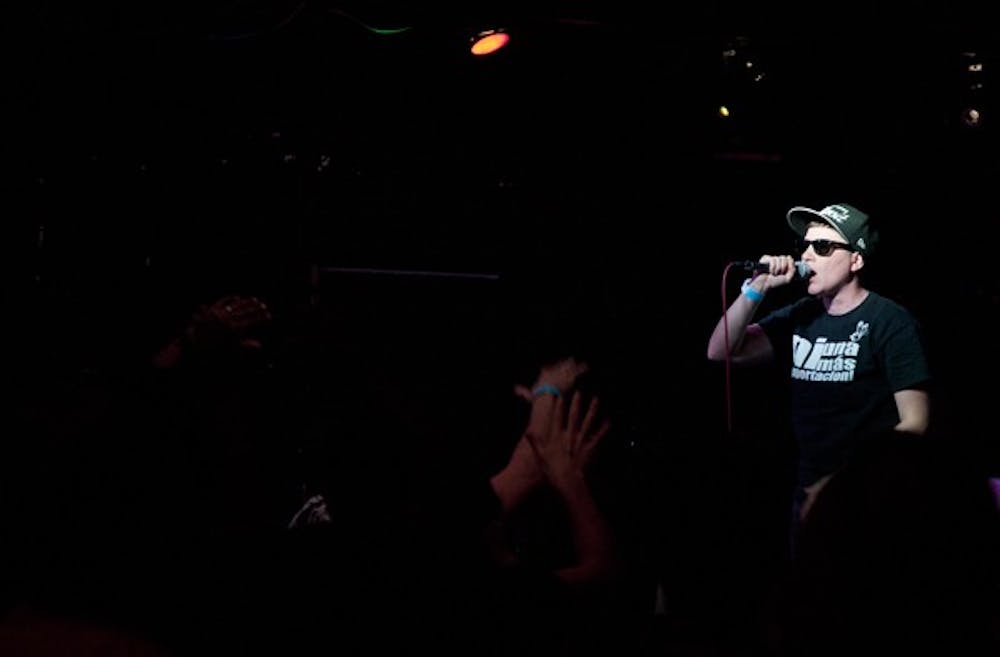 Remi Kanazi, a Palestinian-American poet, performed for the benefit concert hosted by Students for Justice in Palestine Friday night at the Red Owl. All proceeds will go to the Palestinian Children's Relief Fund. (Photo by Perla Farias)
Remi Kanazi, a Palestinian-American poet, performed for the benefit concert hosted by Students for Justice in Palestine Friday night at the Red Owl. All proceeds will go to the Palestinian Children's Relief Fund. (Photo by Perla Farias)Hip-hop artists, spoken word poets and student activists took the stage of Tempe venue Club Red on Friday night to raise support for disadvantaged Palestinian children.
ASU's Students for Justice in Palestine, a group whose mission is to educate the University community on issues in Palestine and inspire social change, hosted the benefit concert. All proceeds went to the nonprofit organization Palestine Children's Relief Fund.
Third year engineering graduate student and SJP board member Dagan Sassarini said he organized the concert to further the group’s mission by using something that speaks to everyone.
“Music is empowering, especially hip-hop,” Sassarini said. “And rather than keep the money for ourselves we figured why not donate it.”
Sassarini said he wanted the concert to bring people together and inform them about Palestinian issues while raising money for PCRF.
PCRF is a nonprofit organization that provides medical care for children in Palestine and the Middle East by sending physicians to the regions or bringing children in need of care to the U.S. It also sponsors the children and provides monthly contributions to them so they can receive consistent care.
The partnership between the two organizations is mutually beneficial and raises money for Palestinian children while allowing students to be politically active, said Sommer Arekat, secretary for PCRF’s Arizona chapter.
“It’s a good coalition because it gets younger people involved, and we are really thankful for their help,” Arekat said. “An issue regarding children is something that hits everybody.”
Arekat said the proceeds from the benefit concert will all go to children in need of medical care.
“We’ll be able to sponsor more kids with that money who don’t have access to the physicians or the experience we have here,” Arekat said.
Remi Kanazi, a spoken word poet and activist who performed at the concert, said he uses his art to educate people about injustice in the world, including the Israeli occupation of Palestine.
“The average 19-year-old doesn’t want to read an op-ed in a newspaper, but through spoken word, I can get their attention,” Kanazi said.
He said he began his career as a writer but realized he was able to use spoken word as a form of artistic expression and activism. He said it is important to use both art and activism to make a difference.
“It’s all about how we can use our art to educate, empower and galvanize people to act,” Kanazi said. “At the end of the day, it’s not about a people or a nation or a flag. No person should face oppression.”
Kanazi is also the author of "Poetic Injustice: Writings on Resistance and Palestine" and a member of U.S. Campaign for the Academic and Cultural Boycott of Israel.
 Hip hop artist, Invincible, performed Friday night at the Red Owl for SJP's benefit concert. All proceeds will be going to the Palestine Children's Relief Fund. (Photo by Perla Farias)
Hip hop artist, Invincible, performed Friday night at the Red Owl for SJP's benefit concert. All proceeds will be going to the Palestine Children's Relief Fund. (Photo by Perla Farias)USACBI is a social movement that boycotts Israeli academic and cultural institutions. The organization wants Israel to end its occupation of Palestinian territories, allow displaced Palestinians to return home and grant equal rights to Palestinians, according to its website.
Kanazi performed a poem titled “This Poem Will Not End Apartheid,” which he said was an illustration of the importance of social activism.
“No single event makes change, but small steps make a wave” Kanazi said. “Rather than putting words on a page how can we as artists make change?"
Libyan-American hip-hop artist Khaled Ahmed, who goes by Khaled M., said he uses hip-hop to inspire people in a way he would not be able to if he were in another profession.
“I can speak on subjects I wouldn’t be able to otherwise,” Ahmed said. “Hip-hop builds bridges like no other genre of music.”
Ahmed said his music is an artistic outlet more than a source of activism, but his passion for Libya has a natural influence on his work.
“I’m just sharing my story, but I hope it builds bridges and inspires people,” Ahmed said.
SJP public relations chair Shifa Alkhatib, a third year law student, said it is important to educate students because they will be able to lobby for Palestine in the future.
“We educate students because schools are where people grow and learn,” Alkhatib said.
Alkhatib said her grandparents became refugees in 1948 when Israel forced them from their homes, and this same fate has plagued millions of Palestinians.
“History shouldn’t repeat itself,” Alkhatib said. “That’s why it’s important to educate people.”
Reach the reporter at jwthrall@asu.edu or follow him @jthrall1




